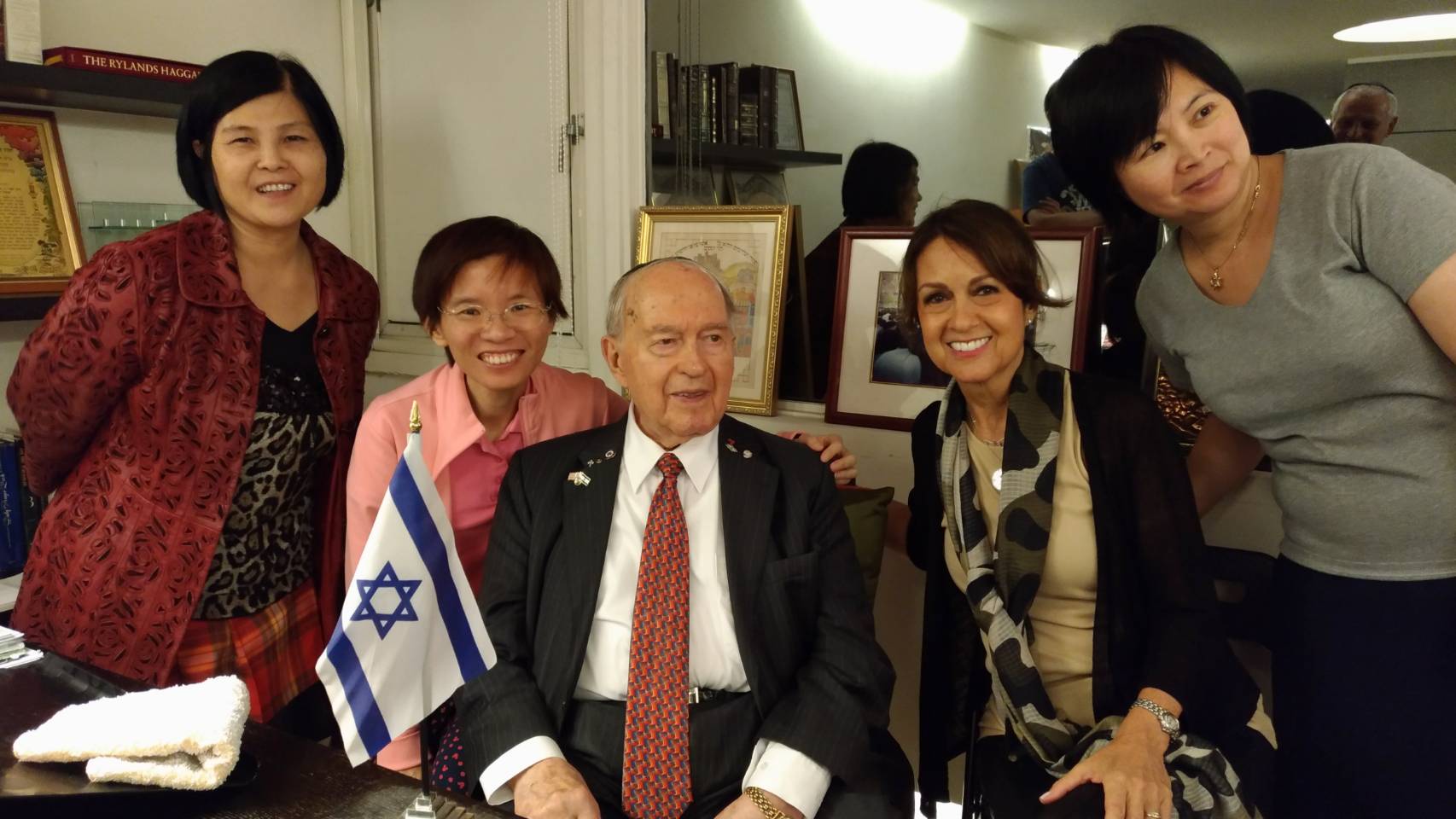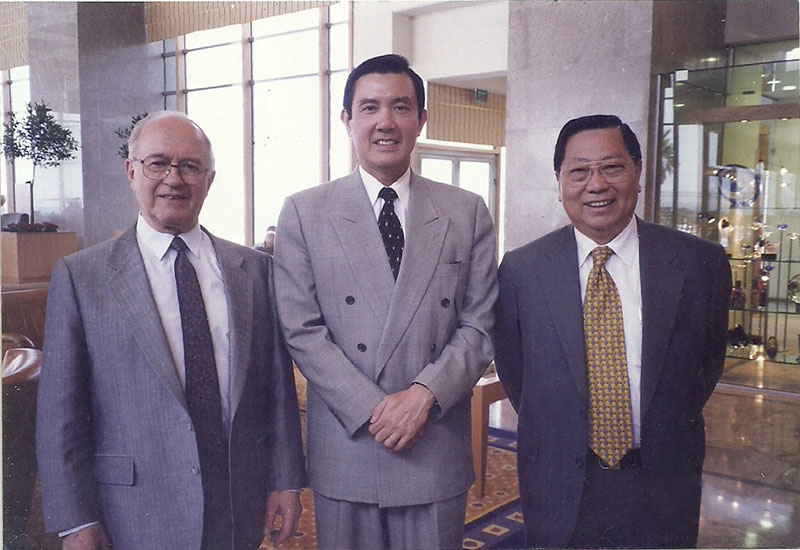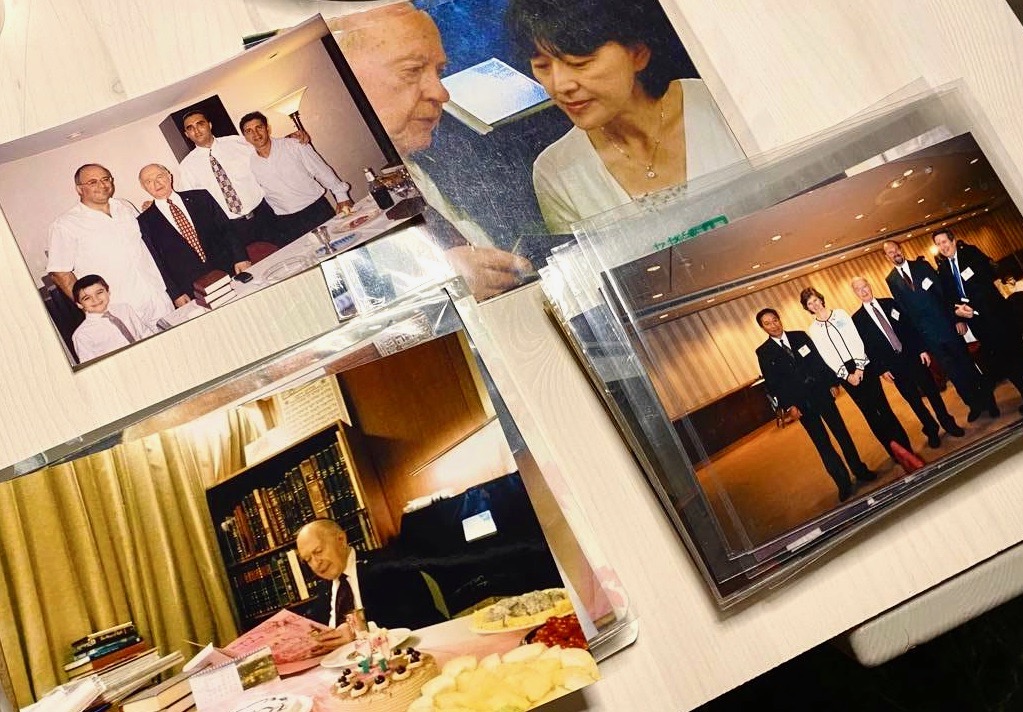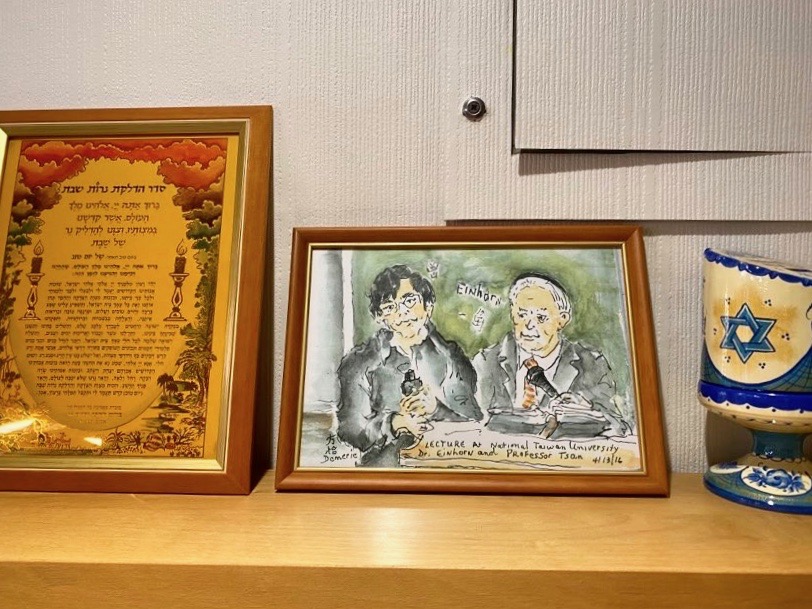The Legacy of Ephraim Einhorn: Rabbi, ambassador, businessman, teacher


above photos courtesy Zoy Chang
One Friday evening at the TJC shul, I was interviewing another community member, Brett Aaron, when the sun was sinking low behind the city skyline. Rabbi Ephraim Ferdinand Einhorn, who had arrived a few minutes before, gestured to his caretaker: it was time to light the shabbos candles. Despite the fact that he could no longer verbally communicate at age 102, he was still lucid, particularly when it came to matters of religion. Einhorn never missed an important ceremony, even at times when stuck in a hospital bed, those close to him say. Until just a few months before he died this September at age 103, he kept busy every day, visiting his office to read, and enjoying Sunday brunch -- a special kosher meal -- every week at the Taipei American Club at a fixed table with his name on it.
“No one thought he would last this long,” is a mantra I heard many times. “You either loved him or you hated him,” Benjamin Schwall, the current president of TJC told me in many conversations. “He was a very complex individual. I don’t think I’ve ever met anyone else even closely like him,” said Don Shapiro, a former president of the TJC.1
Until 2011, Einhorn was Taiwan’s only rabbi. He arrived in Taiwan 1975 and opened his congregation -- always separate from the TJC -- in 1979s at the President Hotel (services would later be moved to the Ritz), where he mostly served traveling businessmen and those who could not make the trip to the TJC in Tianmu. Those who met him would be presented with a stack of 11 or 12 business cards: Chairman of Republicans Abroad in Taiwan, Vice President of the World Trade Center Warsaw, Honorary Representative of the Poland Chamber of Commerce, President of the World Patent Trading Company, Chairman of Pickwick Company Ltd.2 It’s just one of many stories that has become as synonymous with the rabbi as his huge personality: charming, warm, mysterious, but polarizing and at times, arrogant.
Einhorn was born in Vienna, Austria in 1918 to parents Rabbi Israel and Rosa Einhorn and grew up with two brothers -- Yitzchak, who became a world expert on Judaica, and Victor, a doctor who provided medical services to Jewish refugees in Rome after World War II and later to Jews in Iran who were trying to flee -- and one sister, about whom not much is known. In Vienna, Einhorn attended his father’s Torah classes in addition to secular school and soon left to pursue yeshiva at the young age of 13, a proper illui, or torah prodigy. His first stop was “Insituto Superiore di Tora,” or the Superior Torah institute in Fiume, Italy (now Rijeka, Croatia); that seminary soon closed and Einhorn moved on to a seminary in Heide, Belgium; later he applied to a third to finish his schooling at the Etz Chayim yeshiva in London, which has produced notables like Chief Rabbi Jonathan Sacks. At all three, Einhorn did not apply and was even turned away by a few due to his young age, yet each ultimately accepted him after seeing his great talent and passion.3 He later received his doctorate in philosophy in London along with a rabbinical ordination.4
While in London, World War II broke out and Einhorn lost both of his parents in the Holocaust, his father at Sachenhausen in Germany and his mother at Auschwitz. During the war, Einhorn accompanied children who were evacuated from London to surrounding cities. After the war he worked for the Union of Maccabi Association of Great Britain and Ireland took a position with the World Jewish Congress. As head of the information department and national organizer for Great Britain and Ireland, he traveled the world, met with presidents and prime ministers, and helped provide legal assistance to Jews in Arab countries. From there, Einhorn led Jewish congregations across North America in Toronto, Pennsylvania, Michigan and California, “where he also served as president of the American Jewish Congress for the 11 Western states”5 and continued occasional work with the WJC. In Pasadena, Einhorn and his wife Ruth Weinberg, who he had met in Haifa in 1951, had two daughters, Daphne and Sharone.
Throughout his stint at the WJC, where he was frequently making clandestine missions to countries in Central and South America, North Africa, Europe and the Middle East, Einhorn began develop a reputation as a bit of a loose cannon. After one mission to Iraq in 1951, in which Einhorn disguised himself as a Christian minister to investigate the alleged torture of a group of Iraqi Jews, he openly talked about the mission to the press in Detroit -- where he was serving as a rabbi at the time -- without authorization. The media attention made members of his congregation anxious while WJC officials worried that he was jeopordizing the mission and potentially endangering the Iraqi Jews he was trying to bring to the United States, according to WJC archives. Wrote Maurice Perlzweig, Einhorn’s senior, he had a “passion for publicity” and discouraged other WJC officials from supporting his missions, as there was “an infinite possibility of mischief if he were let loose.”6
The situation helps explain his abrupt career change to business. He founded the World Patent Corporation in 1968 and opened a branch in Prague; the business took him to cities across Europe and to Czechoslovakia, from which he was expelled for activities “incompatible with the interests of the State.”7 He later became a financial advisor for a Kuwaiti company, which sent him to Taiwan in 1975. He remained there for the rest of his life. As a result of his travels and studies, Einhorn could speak English, Hebrew, German, Italian, Czech/Slovak, Hungarian, and two dialects of Yiddish, but he never learned Chinese.8
 Ephraim Einhorn (left) with former President of the Republic of China and Mayor of Taipei,
Ephraim Einhorn (left) with former President of the Republic of China and Mayor of Taipei, Ma Ying-Jeou, (center) and Taiwan Representative to Israel R.T. Yang. Courtesy Ephraim Einhorn.
Einhorn didn’t immediately become Taiwan’s rabbi upon arrival; at first, he primarily pursued business, lending occasional rabbinical services to the TJC on holidays. Around 1981, he set up shop and opened a congregation at a room in the Ritz hotel; its kitchen was able to provide kosher meals. A 2002 Jewish World Review article described it as “a cramped, narrow hotel room--two dozen or so banquet chairs, facing a modest table with candlesticks, a lectern set between two elegant lamps, a small Holy Ark. Books are piled everywhere. In the bathroom, cases of kosher wine are stacked in the bathtub.”9 His audience was mostly traveling business people who stayed in the hotel, as well as Taiwan residents who lived too far from the TJC, which was located north of the city center. Classically trained in the Orthodox tradition, Einhorn maintained gender separation during services and is remembered as fostering a welcoming environment. His services were filled with stories and he encouraged everyone to participate:
Because he's such a passionate person, he would have the service, then all of a sudden he’d digress into a story and say, where are you from, Jordyn, New Hampshire? Oh, then he tells you everything you never needed to know about New Hampshire and how he the governor was a friend of his...and it would go off into a tangent about something, something always will lead back.10
Not everyone took well to Einhorn. According to Chitayat, TJC members were skeptical when he first arrived. Rumors of him being a Mossad agent -- fueled by his eviction from Czechoslovakia -- circulated and persist today: “Most of the Americans who weren’t Jewish always thought he was with the CIA. All I know is that he had unbelievable connections in Taiwan.….he wasn’t very popular in the old days and people were a bit suspect about people working with Arab countries. And there was this sort of distrust.”11
His strong personality could also be polarizing. With Einhorn’s great connections, he offered help to almost anyone who sought it from him, arranging special medical flights, getting people out of jail, and helping many with visa and immigration issues. Chitayat remembers that once at a holiday service, after offering a community member a loan, “he’d made sure that he mentioned that we give this loan...making a big point of it...This was another thing he did that probably bothered people.”12


Left: community members look through photos of Einhorn at the Taiwan Jewish Community shul days before he died.
Right: an illustration of Einhorn teaching local students about Judaism at National Taiwan University.
Right: an illustration of Einhorn teaching local students about Judaism at National Taiwan University.
Einhorn died on September 15, 2021, on erev Yom Kippur, just days after he turned 103. His body was sent to Israel where he was buried in Petah Tikvah. “Dr. Einhorn in my opinion was the one thing that gave consistency to the Jewish community over the past 50 years and will be missed by many as the Jewish Community of Taiwan moves into a new era,” said Jeffrey Schwartz in an obituary in JTA.14
Despite his flaws, Einhorn is today deeply respected among all within the community, who credit him with helping shape and preserve Jewish life in Taiwan. Years after the TJC and Einhorn’s congregation merged, hazzan Leon Fenster, who had previously spent time in Beijing, was invited to help Einhorn lead services. Today, Fenster serves as the TJC’s primary religious leader. Jeffrey Schwartz, a longtime Taiwan resident and donor to the Jewish community, has dedicated a mosaic in his new synagogue -- set to open in late 2021 -- to Einhorn: a unicorn, einhorn in German.
Sources
- Haime, Jordyn. “Taiwan’s Longtime Rabbi, Whose Life Brimmed with International Intrigue, Dies at 103.” JTA. September 15, 2021.
- Philips, David A. EFE. Red Cloud, NE: Consultimate international, inc., 2006. 2.
- Ibid., 5-11.
- Shapiro, Don. Ms. Taipei: Survival of a Jewish Community without Deep Roots. Haifa University, n.d. 11.
- Ibid.
- Einhorn, Ephraim F., 1951-52; 1954; 1958. Series B, Subseries 2, Box B48, World Jewish Congress Archives, Cincinnati, Ohio.
- JTA. “Daily News Bulletin,” June 28, 1973.
- Shapiro, Don. Ms. Taipei: Survival of a Jewish Community without Deep Roots. Haifa University, n.d. 11.
- Steinberg, Neil. “A Down-Home Davening...in Taiwan.” Jewish World Review, August 9, 2002.
- Aaron, Brett (Current TJC board member and Taiwan resident). Interview with the author. May 7, 2021.
- Chitayat, Fiona (former TJC vice president and founding member). Interview with the author. June 24, 2021.
- Ibid.
- Haime, Jordyn. “Taiwan’s Longtime Rabbi, Whose Life Brimmed with International Intrigue, Dies at 103.” JTA. September 15, 2021.